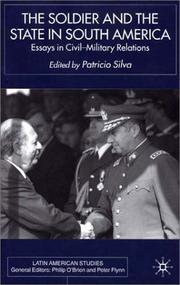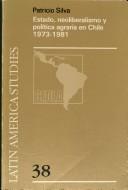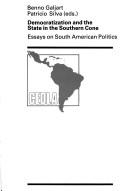| Listing 1 - 10 of 15 | << page >> |
Sort by
|

ISBN: 0333930932 Year: 2001 Publisher: New York : Palgrave,
Abstract | Keywords | Export | Availability | Bookmark
 Loading...
Loading...Choose an application
- Reference Manager
- EndNote
- RefWorks (Direct export to RefWorks)
Book
ISBN: 0333714830 Year: 2001 Publisher: Basingstoke Palgrave
Abstract | Keywords | Export | Availability | Bookmark
 Loading...
Loading...Choose an application
- Reference Manager
- EndNote
- RefWorks (Direct export to RefWorks)
Book
ISBN: 9780271036106 Year: 2021 Publisher: University Park, PA
Abstract | Keywords | Export | Availability | Bookmark
 Loading...
Loading...Choose an application
- Reference Manager
- EndNote
- RefWorks (Direct export to RefWorks)

Abstract | Keywords | Export | Availability | Bookmark
 Loading...
Loading...Choose an application
- Reference Manager
- EndNote
- RefWorks (Direct export to RefWorks)
323 <83> --- Agriculture and state --- -Land reform --- -Agrarian reform --- Economic policy --- Land use, Rural --- Social policy --- Agrarian question --- Agricultural policy --- Agriculture --- State and agriculture --- Land reform --- Binnenlandse politiek--Chili --- History --- -History --- -Government policy --- Chile --- Politics and government --- -Agriculture and state --- -Binnenlandse politiek--Chili --- -Chile --- -323 <83> --- 323 <83> Binnenlandse politiek--Chili --- Chili --- Cile --- Chih-li --- Ts'ileh --- República de Chile --- Republic of Chile --- チリ --- Chiri --- Чили --- Çili Respublikası --- Чылі --- Chyli --- Рэспубліка Чылі --- Rėspublika Chyli --- Tsile --- Republika Čile --- Xile --- República de Xile --- Chilská republika --- Gweriniaeth Tsile --- Republikken Chile --- Republik Chile --- Chilska --- Republika Chilska --- Tšiili --- Tšiili Vabariik --- Χιλή --- Δημοκρατία της Χιλής --- Dēmokratia tēs Chilēs --- Cîl --- Чили Мастор --- Chili Mastor --- Чили Республикась --- Chili Respublikasʹ --- Ĉilio --- Ĉilia Respubliko --- Repúbrica de Chili --- Txile --- Txileko Errepublika --- Kili --- Lýðveldið Kili --- République du Chili --- Sily --- Ciile --- Ndenndaandi Ciile --- An tSile --- Yn Çhillee --- Çhillee --- Pobblaght ny Shillee --- Shillee --- An t-Sile --- t-Sile --- Tilì --- Poblachd na Sile --- Чилмудин Орн --- Chilmudin Orn --- Ch'ille --- Lepupalika ʻo Chile --- Republik Chili --- iChile --- ITshile --- Síle --- Lýðveldið Síle --- Repubblica del Cile --- צ'ילה --- Tsilah --- רפובליקה של צ'ילה --- Republiḳah shel Tsilah --- Agrarian reform --- Government policy

ISBN: 9070280515 9789070280512 Year: 1989 Publisher: Amsterdam: CEDLA,
Abstract | Keywords | Export | Availability | Bookmark
 Loading...
Loading...Choose an application
- Reference Manager
- EndNote
- RefWorks (Direct export to RefWorks)
Representative government and representation --- Democracy --- Democratization
Book
ISBN: 9783847355427 3847355422 Year: 2012 Publisher: Saarbrücken: Editorial Académica Española,
Abstract | Keywords | Export | Availability | Bookmark
 Loading...
Loading...Choose an application
- Reference Manager
- EndNote
- RefWorks (Direct export to RefWorks)
This study aims to present the experience of architecture co-generated with poetry found at the far southern tip of the Americas in Chile. An experience that listens to the inaugural poetic word, then seeks to open a field that will enable construction of its origin and, within it, to formulate the primordial question, namely: the destiny of the American being, a question common to all trades, which is listened for here in the rhythm given to action. The thesis focuses on the study of the Open City: its origins and generation. Its creative sphere and architecture, which is the product of the poetic orientation of a poetry known as "ha lugar," a poetry that seeks to merge life with work and study. To this end, a subject was chosen that is common to all trades and that, in the context of this architecture, is cross cutting, namely: hospitality. Thus, not only is the architecture itself laid out, but an attempt is made to explain the whole, the so-called "creative sphere" of the Workshops, where people think, plan and ultimately build together, giving rise to a passage of time they call "tempo," of which they render public accounts every ten years. The foregoing points are the general objectives of the thesis. It is structured as follows: First, the location: Chile. The City− not settlement− with a founding act. From the viewpoint of being a city, striving to be it and not merely become it in time. Hence, the most public aspect serves as the starting point: the agora, where anyone may take the floor. The Open City. Not only as opposed to our own cities. Open to the trade of architect, which is constantly being reinvented. Open to reawakening the world's passions. The Open City of Amereida. It is the epic poetry of America, the poetry of "ha lugar," the American Aeneid. It is poetry that explores the sense and meaning of being American, that probes the destiny of Americans in this land that was not discovered but given, invented. Amereida proposes a direction for the continent, a change of bearings. "Thesis of the North itself." Guidance descending the Southern Cross. The Open City of Amereida: Architecture. Conceived of as the trade through which man acts in the world, creating it through co-generation with poetry. A guided extension that accommodates. Spaces conceived of in the creative rigor of the foundation, which gives rise to form, made possible through observation. The Open City of Amereida: Architecture from. That is, to have a starting point, a point of view, a theory grounded in direct observation through drawing and text, which constitutes the theoretical basis that is the foundation, along with the architectural elements of the Open City. The Open City of Amereida: Architecture from Hospitality. Understood as that perhaps noblest of all human acts that consists of truly hearing the other. It can thus be understood and seen that to offer a home is to enter the other observing in order to reveal the happening, to present it. To accommodate is to comprehend that the task is to accommodate the other fully. The specific objectives of the thesis are: 1. To lay out this experience, endeavoring not to offer it as a model, but simply as part of the architecture. Hence, the preference for showing, rather than disseminating. 2. To lay out the genesis of the architectural work: taking the postulate of hospitality and broadening its significance to habitable space. An experience that seeks to approach architecture from an internal foundation, which is achieved through observation. The methodology used was as follows: 1. To gather and compile virtually all original, unpublished texts and use them to form a corpus, the theoretical foundation of the aforementioned endeavor. 2. To visit the works and record the experiences of those who dwell in this place. 3. To reflect, while analyzing six selected works, in order to discover the acts that originated them and understand the collective method, known as "round," that was used. A reflective analysis of the works, along with the texts of poets, philosophers and architects, to sound out the word "hospitality" from the viewpoints of the different trades. The thesis is composed of three corpuses: the thesis itself; the key texts making up the theoretical approach; the texts explaining the work performed by the doctoral student.
Book
ISBN: 1282949926 9786612949920 9047431898 Year: 2009 Publisher: Leiden ; Boston : Brill,
Abstract | Keywords | Export | Availability | Bookmark
 Loading...
Loading...Choose an application
- Reference Manager
- EndNote
- RefWorks (Direct export to RefWorks)
From democratic restoration in the 1980's up to today, most Latin American countries have been struggling constantly to find a workable balance between the need to strengthen the authority of state institutions and their citizens’ aspirations to have a real say in the decision-making process. This book looks at the contrasting ways in which both Brazil and Chile have been dealing with societal demands for participation during the last two decades. The contributors to this volume highlight a series of historical and political factors that help to understand why Brazil has been able to introduce innovative democratizing policies while Chile has largely failed in the advancement of participatory schemes as its decision-making process continues to be heavily top-down and technocratic. Contributors: Rebecca N. Abers, Gianpaolo Baiocchi, Adolfo Castillo Díaz, Herwig Cleuren, Gonzalo Delamaza, Vicente Espinoza, Joe Foweraker, Marcus Klein, Kees Koonings, Adalmir Marquetti, Patricio Navia, William R. Nylen, Paul W. Posner, Patricio Silva, and Brian Wampler.
Political participation --- Brazil --- Chile --- Politics and government
Book
ISBN: 9073782325 Year: 1995 Publisher: Leiden Research School CNWS
Abstract | Keywords | Export | Availability | Bookmark
 Loading...
Loading...Choose an application
- Reference Manager
- EndNote
- RefWorks (Direct export to RefWorks)
Economic development --- Planners --- Planning --- Congresses --- Developing countries --- Economic policy --- Congresses.
Book
ISBN: 1003254357 1000559211 1000559270 1003254357 Year: 2022 Publisher: London ; New York, New York : Routledge,
Abstract | Keywords | Export | Availability | Bookmark
 Loading...
Loading...Choose an application
- Reference Manager
- EndNote
- RefWorks (Direct export to RefWorks)
"This book investigates why Chile suddenly descended into violence and revolution in 2019, after almost thirty years of peace, during which time the country was broadly regarded as Latin America's most successful nation. Since democratic restoration in 1990, Chile's relatively high levels of stability, increasing prosperity and social modernisation have stood out in a region shaken by social and political convulsion and economic malaise. In early 2019, President Sebastián Piñera confidently claimed that Chile represented a true 'oasis' of political stability and economic vitality. However, just weeks later, the announcement of a small increase in the price of Santiago's underground transport system unleashed an unprecedented wave of extremely violent anti-government protests in the country, with protestors ultimately demanding Piñera's resignation and the end of neoliberalism and the 1980 Constitution, amongst many other demands. This book analyzes the causes of Chile's socio-political upheaval, arguing that the neoliberal model and fast process of economic transformation led to a series of destabilizing political processes in the country. At a time when much analysis of the October uprising tends to be superficial or polarized on ideological grounds, this book provides a much needed sociological and institutional analysis of the crisis. It will be an important read for scholars of Latin American politics and development, as well as those with a broader interest in state legitimacy, social movements, and political contestation against neoliberalism"--
Political violence --- Social change --- Government, Resistance --- Protest movements --- History --- Chile --- Economic conditions --- Politics and government --- Social conditions
Dissertation
ISBN: 9789056683597 Year: 2013 Publisher: Tilburg Universiteit van Tilburg
Abstract | Keywords | Export | Availability | Bookmark
 Loading...
Loading...Choose an application
- Reference Manager
- EndNote
- RefWorks (Direct export to RefWorks)
| Listing 1 - 10 of 15 | << page >> |
Sort by
|

 Search
Search Feedback
Feedback About UniCat
About UniCat  Help
Help News
News